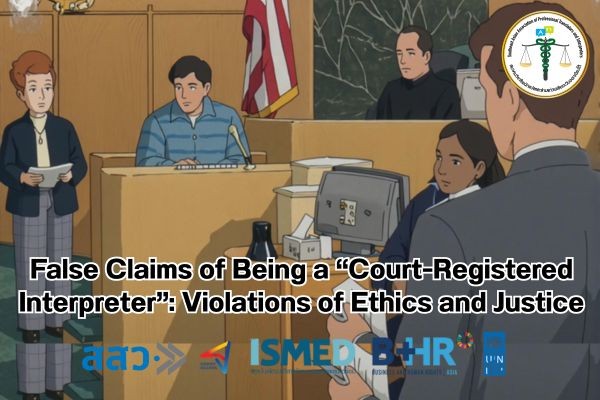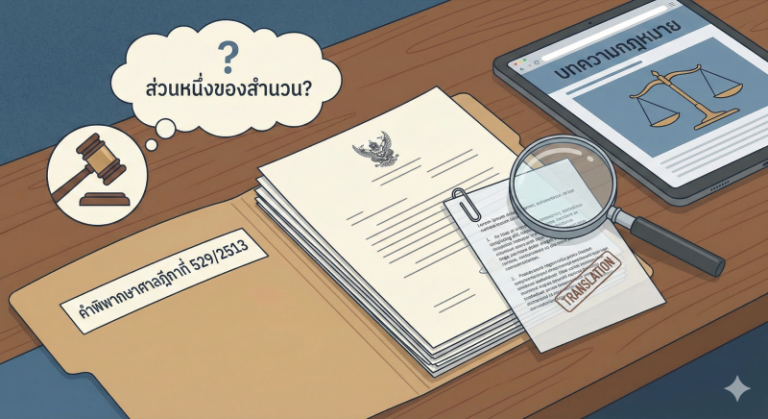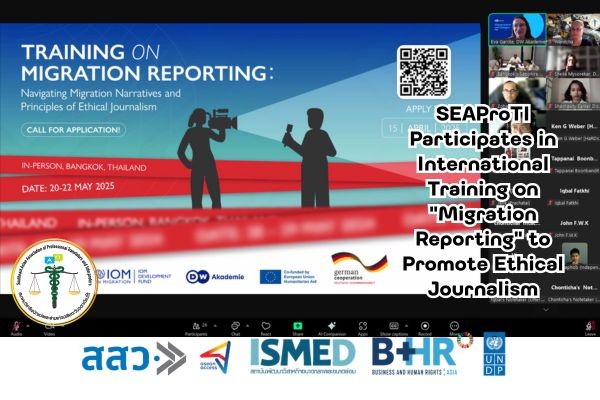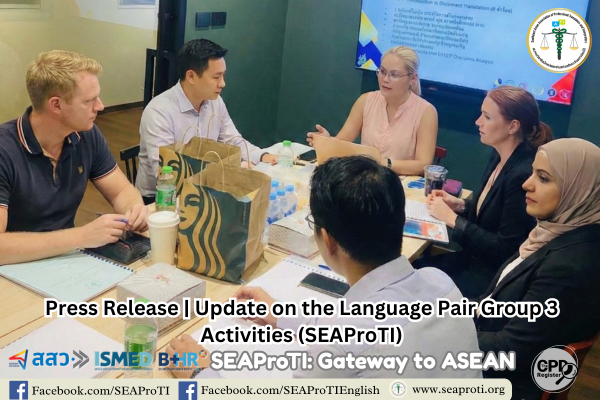False Claims of Being a “Court-Registered Interpreter”: Violations of Ethics and Justice
29 June 2025, Bangkok — The Role of Professional Interpreters in Thailand’s Labour Courts: Ethical Concerns and Deviations from International Standards
This past week, professional interpreters certified by the Southeast Asian Association of Professional Translators and Interpreters (SEAProTI) were assigned to perform duties in the Thai Labour Court, where proceedings closely resemble those of the civil court system, particularly with respect to interpreter use.
According to the Judiciary Officials’ Practice Manual, it is clearly stated that parties to a case are generally responsible for procuring their own interpreters, negotiating work hours and fees independently. However, if a party is unable to provide their own interpreter, they may request one from the court, in which case the requesting party must pay the interpreter’s fees as specified by court regulations.
In a recent case before the Labour Court, a SEAProTI-certified interpreter encountered a challenge when the defendant brought their own interpreter, claiming to be “registered with the court.” This assertion, made without verification, created an atmosphere of deference and perceived authority in the courtroom. Yet once the interpreter began translating, it became apparent that their approach diverged significantly from international standards. Issues observed included:
- Omission of key content or use of summary translation
- Addition of information not actually stated by the speaker
- Mistranslation due to limited comprehension of the source language
- Lack of understanding of domain-specific terminology, such as in marketing and salesRole conflict, as the interpreter was also a practicing lawyer, raising concerns about impartiality
This situation highlights the urgent need for clearly defined qualifications and ethical guidelines for interpreters in Labour Court settings—particularly where false claims of being a “court-registered interpreter” may mislead the court and infringe upon the rights of the parties involved.
SEAProTI emphasizes the importance of interpreter ethics and calls for mechanisms to verify and regulate interpreter credentials. Misrepresentation not only threatens the integrity of judicial proceedings but undermines trust in the interpreting profession.
Introduction
In legal proceedings, interpreters play a critical role in ensuring that oral communication is conveyed accurately, completely, and impartially across languages, particularly when parties involved are foreign nationals or individuals with limited proficiency in the court’s language (Mikkelson & Jourdenais, 2015). However, instances have emerged in which individuals falsely claim to be “court-registered interpreters” despite lacking the necessary qualifications or performing substandard interpretation. Such conduct presents significant ethical and legal concerns.
Motives Behind False Claims
Individuals who falsely present themselves as court-registered interpreters without undergoing proper training or certification may be driven by several motives:
- To gain credibility:
- Claiming to be court-registered lends immediate authority and trustworthiness in the eyes of judges, attorneys, and clients, even if the individual lacks actual competence.
- For financial gain:
- The perceived status can justify higher rates and improve job prospects in high-stakes cases.
- To manipulate interpretation:
- In some cases, interpreters may deliberately distort messages to favor one party, compromising the impartial role expected of court interpreters (Hale, 2007).
Violations of Interpreter Ethics
Interpreter codes of conduct, especially in court contexts, emphasize accuracy, impartiality, and confidentiality as core ethical principles (National Association of Judiciary Interpreters and Translators [NAJIT], 2016). Deviations such as omissions, additions, and misinterpretations constitute serious breaches. For example:
- Misinterpretation may distort the facts and influence the court’s ruling.
- Omission of key information can deprive parties of their right to fully communicate.
- Biased additions or framing may unfairly benefit one side.
Infringement on the Rights of Involved Parties
When an unqualified interpreter delivers inaccurate or misleading interpretations, this directly infringes upon fundamental rights, including:
- Fair trial rights:
- Defendants or witnesses may be misrepresented, leading to unjust outcomes.
- Public confidence in justice:
- Translation errors can mislead courts and result in judgments based on inaccurate information.
- Consumer rights:
- Parties hiring interpreters have the right to expect services that meet professional standards. False representation constitutes a form of deception.
Safeguards and Preventive Measures
- Establish a verifiable registry of certified interpreters, maintained by professional associations or the judiciary.
- Promote standardized interpreter certification based on objective assessments and transparent criteria.
- Enforce disciplinary or legal consequences for those who impersonate certified interpreters or provide court interpretation services without proper qualifications.
Conclusion
Falsely claiming to be a “court-registered interpreter” while providing inaccurate, incomplete, or distorted interpretation is not only unethical but also a violation of due process. It endangers fair judicial outcomes and damages the credibility of the interpreting profession. As such, regulatory bodies must take proactive steps to implement credential verification, uphold professional standards, and protect the rights of those involved in the judicial system.
In light of the above case, it is recommended that the opposing party arrange for a certified interpreter from a recognized professional association or any institution whose interpreters adhere to international standards. The party should notify the court in advance of their intention to bring an expert interpreter to act as a check interpreter, observing and verifying the accuracy of the interpretation provided by the opposing party’s interpreter. This measure serves to protect the rights of all parties and uphold fairness in the judicial process.
Furthermore, it is proposed that the court consider allowing expert interpreters from other accredited professional associations who meet recognized standards and maintain impartiality to participate as co-interpreters or observers. This would enhance transparency and public confidence in the proceedings, particularly in cases where concerns have been raised about the quality or neutrality of an interpreter appointed by one party.
References
- Hale, S. (2007). Community Interpreting. Palgrave Macmillan.
- Mikkelson, H., & Jourdenais, R. (Eds.). (2015). The Routledge Handbook of Interpreting. Routledge.
- National Association of Judiciary Interpreters and Translators. (2016). Code of Ethics and Professional Responsibilities. Retrieved from https://najit.org/ethics/
- SEAProTI. (2024). Professional Code for Certified Court Interpreters in Thailand. Bangkok: Southeast Asian Association of Professional Translators and Interpreters.
SEAProTI’s certified translators, translation certification providers, and certified interpreters:
The Southeast Asian Association of Professional Translators and Interpreters (SEAProTI) has officially announced the criteria and qualifications for individuals to register as “Certified Translators,” “Translation Certification Providers,” and “Certified Interpreters” under the association’s regulations. These guidelines are detailed in Sections 9 and 10 of the Royal Thai Government Gazette, issued by the Secretariat of the Cabinet under the Office of the Prime Minister of the Kingdom of Thailand, dated July 25, 2024, Volume 141, Part 66 Ng, Page 100.
To read the full publication, visit: the Royal Thai Government Gazette
การแอบอ้างเป็น “ล่ามขึ้นทะเบียนกับศาล” กับการละเมิดจรรยาบรรณและสิทธิในกระบวนการยุติธรรม
29 มิถุนายน 2568, กรุงเทพมหานคร – การปฏิบัติหน้าที่ของนักวิชาชีพล่ามในศาลแรงงาน: ประเด็นจริยธรรมและแนวปฏิบัติที่คลาดเคลื่อนจากมาตรฐานสากล ในสัปดาห์ที่ผ่านมา นักวิชาชีพของสมาคมวิชาชีพนักแปลและล่ามแห่งเอเชียตะวันออกเฉียงใต้ (SEAProTI) ได้รับมอบหมายให้ปฏิบัติหน้าที่ในศาลแรงงาน ซึ่งมีลักษณะกระบวนพิจารณาคดีใกล้เคียงกับศาลแพ่ง โดยเฉพาะในเรื่องการใช้ล่าม โดยตามคู่มือปฏิบัติราชการของข้าราชการตุลาการ ได้ระบุอย่างชัดเจนว่า โดยหลักการ คู่ความจะเป็นผู้จัดหาล่ามมาเอง และตกลงอัตราค่าจ้างกันโดยตรง อย่างไรก็ตาม หากคู่ความไม่สามารถจัดหาล่ามได้ ก็สามารถยื่นคำร้องขอให้ศาลจัดหาล่ามให้ได้ โดยคู่ความจะต้องรับผิดชอบค่าจ้างล่ามตามอัตราที่กำหนดไว้ในระเบียบศาล
ในคดีล่าสุดที่ดำเนินการโดยศาลแรงงาน นักวิชาชีพล่ามของสมาคมฯ ได้ประสบสถานการณ์ที่ถูกท้าทายโดยฝ่ายจำเลย ซึ่งได้นำล่ามของตนมาเอง พร้อมทั้งอ้างว่าเป็น “ล่ามขึ้นทะเบียนกับศาล” โดยไม่มีการตรวจสอบข้อเท็จจริง และส่งผลต่อบรรยากาศในห้องพิจารณาคดี ทั้งในด้านความน่าเชื่อถือและความเกรงใจของผู้ที่อยู่ในกระบวนการพิจารณา อย่างไรก็ตาม เมื่อล่ามรายดังกล่าวเริ่มปฏิบัติหน้าที่ กลับพบว่ามีแนวทางการแปลที่คลาดเคลื่อนจากมาตรฐานวิชาชีพล่ามและแนวปฏิบัติสากลอย่างชัดเจน เช่น
- การแปลไม่ครบถ้วน (omission) หรือแปลแบบตัดเนื้อหาสำคัญ (summary translation)
- การแปลเพิ่มเติมจากสิ่งที่ผู้พูดไม่ได้กล่าว (addition)
- การแปลผิดเนื่องจากฟังภาษาเป้าหมายไม่เข้าใจลึกซึ้ง
- การขาดความรู้ด้านศัพท์เฉพาะทาง เช่น ศัพท์ด้านการตลาดและการขาย
- การที่ล่ามมีสถานะเป็นทนายความ อาจส่งผลให้แนวคิดและจุดยืนของล่ามเอนเอียงหรือขาดความเป็นกลาง
สถานการณ์ดังกล่าวสะท้อนให้เห็นถึงความสำคัญของการกำหนดมาตรฐานคุณสมบัติและแนวทางการทำงานของล่ามในศาลแรงงานอย่างชัดเจน โดยเฉพาะในกรณีที่มีการแอบอ้างสถานะการเป็น “ล่ามขึ้นทะเบียนกับศาล” ซึ่งอาจส่งผลกระทบต่อสิทธิของคู่ความ ความยุติธรรมในกระบวนการพิจารณา และความน่าเชื่อถือของวิชาชีพล่ามโดยรวม
สมาคมฯ เห็นความจำเป็นในการเสริมสร้างความรู้เกี่ยวกับจรรยาบรรณและมาตรฐานการแปลในศาลแก่ผู้เกี่ยวข้องทุกฝ่าย และเรียกร้องให้มีระบบตรวจสอบสถานะและคุณสมบัติของผู้ที่อ้างตนว่าเป็นล่ามในศาลอย่างโปร่งใสและตรวจสอบได้
บทความนี้วิเคราะห์พฤติกรรมของผู้ที่แอบอ้างว่าเป็น “ล่ามขึ้นทะเบียนกับศาล” ทั้งที่ขาดคุณสมบัติหรือความสามารถที่แท้จริง โดยเฉพาะในกรณีที่การแปลมีความผิดพลาด ไม่ครบถ้วน หรือบิดเบือนความหมายจากต้นฉบับ ซึ่งพฤติกรรมดังกล่าวไม่เพียงส่งผลต่อความน่าเชื่อถือของวิชาชีพล่ามเท่านั้น แต่ยังเป็นการละเมิดจรรยาบรรณวิชาชีพและสิทธิของคู่ความในกระบวนการยุติธรรมด้วย บทความนี้นำเสนอวัตถุประสงค์ที่เป็นไปได้ของการแอบอ้าง การละเมิดหลักจริยธรรม และแนวทางการคุ้มครองสิทธิของผู้ที่ได้รับผลกระทบจากการแปลที่ไม่ถูกต้อง
บทนำ
ในกระบวนการยุติธรรม ล่ามมีบทบาทสำคัญในการถ่ายทอดสาระของถ้อยคำระหว่างภาษาต่าง ๆ อย่างถูกต้อง ครบถ้วน และเป็นกลาง เพื่อคุ้มครองสิทธิของคู่ความทุกฝ่าย โดยเฉพาะในกรณีที่คู่ความเป็นชาวต่างชาติหรือบุคคลที่ไม่สามารถใช้ภาษาของศาลได้ (Mikkelson & Jourdenais, 2015) อย่างไรก็ตาม มีกรณีที่บุคคลบางรายอ้างตนว่าเป็น “ล่ามขึ้นทะเบียนกับศาล” ทั้งที่ขาดคุณสมบัติ หรือแปลผิดจากต้นฉบับอย่างร้ายแรง ซึ่งเป็นปัญหาที่น่าเป็นห่วงทั้งในเชิงจริยธรรมและกฎหมาย
วัตถุประสงค์ของการแอบอ้าง
ผู้ที่อ้างตนว่าเป็นล่ามขึ้นทะเบียนกับศาลโดยไม่ผ่านการอบรมหรือรับรองอย่างถูกต้อง อาจมีเจตนาดังนี้
- เพื่อสร้างความน่าเชื่อถือ:
- การแสดงตนว่าเป็นล่ามขึ้นทะเบียนช่วยสร้างความไว้วางใจจากศาล ทนายความ และผู้ใช้บริการ แม้จะขาดทักษะหรือประสบการณ์จริง
- เพื่อผลประโยชน์ทางเศรษฐกิจ:
- การอ้างสถานะที่สูงกว่าสถานะจริงอาจทำให้เรียกค่าจ้างในอัตราที่สูงขึ้น หรือได้รับเลือกให้ปฏิบัติงานในคดีสำคัญ
- เพื่อแทรกแซงข้อมูล:
- ในบางกรณี ล่ามอาจบิดเบือนข้อความโดยเจตนาเพื่อสนับสนุนฝ่ายใดฝ่ายหนึ่ง ซึ่งเป็นการขัดต่อหลักการเป็นกลาง (Hale, 2007)
การละเมิดจรรยาบรรณของล่าม
มาตรฐานจรรยาบรรณของวิชาชีพล่าม โดยเฉพาะในบริบทของการทำงานในศาลนั้นเน้นหลัก 3 ประการ ได้แก่ ความถูกต้อง (accuracy), ความเป็นกลาง (impartiality) และความลับ (confidentiality) (National Association of Judiciary Interpreters and Translators [NAJIT], 2016) การแปลผิด แปลไม่ครบ หรือแปลบิดเบือน นับเป็นการละเมิดหลักการเหล่านี้อย่างร้ายแรง เช่น
- แปลผิดทำให้ศาลเข้าใจข้อเท็จจริงคลาดเคลื่อน อาจมีผลต่อคำพิพากษา
- การแปลไม่ครบเป็นการตัดทอนสิทธิคู่ความในการสื่อสารสาระสำคัญ
- การบิดเบือนข้อมูลอาจเข้าข่ายจงใจเอื้อประโยชน์ให้กับฝ่ายใดฝ่ายหนึ่ง
การละเมิดสิทธิของผู้เกี่ยวข้องในกระบวนการยุติธรรม
การแปลที่ผิดพลาดหรือแอบอ้างสถานะที่ไม่ได้รับการรับรอง ส่งผลกระทบโดยตรงต่อสิทธิของบุคคล เช่น:
- ละเมิดสิทธิในกระบวนการพิจารณาที่เป็นธรรม (Fair Trial Rights):
- ผู้เสียหายอาจเป็นจำเลยที่ไม่สามารถชี้แจงข้อเท็จจริงได้ครบถ้วน หรือพยานที่ถูกตีความผิดจากสิ่งที่กล่าว
- การบั่นทอนศรัทธาในระบบยุติธรรม:
- เมื่อเกิดข้อผิดพลาดจากการแปล ศาลอาจตัดสินใจบนพื้นฐานข้อมูลที่ไม่ถูกต้อง ซึ่งทำให้เกิดคำพิพากษาที่ไม่เป็นธรรม
- ละเมิดสิทธิในฐานะผู้บริโภคบริการวิชาชีพ:
- บุคคลทั่วไปหรือทนายความที่จ้างล่ามมีสิทธิได้รับบริการที่ถูกต้องตามมาตรฐาน หากล่ามอ้างตนโดยไม่มีใบรับรองถือเป็นการหลอกลวง
แนวทางการคุ้มครองและป้องกัน
จัดทำระบบตรวจสอบสถานะล่าม ที่ได้รับการรับรองจากหน่วยงานที่เชื่อถือได้ เช่น สมาคมวิชาชีพล่าม หรือหน่วยงานศาล
ส่งเสริมการขึ้นทะเบียนล่ามโดยอิงจากคุณสมบัติและการสอบผ่านมาตรฐานกลาง
กำหนดบทลงโทษสำหรับผู้ที่แอบอ้าง หรือทำงานล่ามโดยไม่มีคุณสมบัติ เช่น การลงโทษทางวินัยหรือทางอาญาในกรณีที่ก่อให้เกิดความเสียหายร้ายแรง
บทสรุป
พฤติกรรมการแอบอ้างว่าเป็น “ล่ามขึ้นทะเบียนกับศาล” ทั้งที่แปลไม่ครบ แปลผิด และแปลบิดเบือน ไม่เพียงแต่ขัดต่อจรรยาบรรณของวิชาชีพล่าม หากแต่ยังเป็นการละเมิดสิทธิขั้นพื้นฐานของผู้ที่เกี่ยวข้องในกระบวนการยุติธรรม และอาจก่อให้เกิดความเสียหายต่อผลคำพิพากษาอย่างร้ายแรง จึงจำเป็นต้องมีการควบคุม กำกับ และกำหนดมาตรฐานวิชาชีพอย่างจริงจัง
ในกรณีข้างต้นนี้ ขอแนะนำให้คู่ความฝ่ายตรงข้ามจัดหาล่ามรับรองจากสมาคมวิชาชีพ หรือหน่วยงานใดก็ได้ ที่ล่ามปฏิบัติหน้าที่เป็นสากล ที่ได้รับการรับรองมาเอง และแจ้งให้ศาลทราบล่วงหน้าว่าจะมีล่ามผู้เชี่ยวชาญร่วมเข้าสังเกตการณ์และตรวจสอบความถูกต้องของการแปล (Check Interpreter) ของล่ามฝ่ายตรงข้าม ทั้งนี้ เพื่อเป็นการรักษาสิทธิของคู่ความและความยุติธรรมในกระบวนการพิจารณา
นอกจากนี้ ขอเสนอให้ศาลพิจารณาเปิดโอกาสให้ล่ามผู้เชี่ยวชาญจากสมาคมวิชาชีพอื่น ๆ ที่มีมาตรฐานและเป็นกลางเข้าร่วมปฏิบัติหน้าที่ในฐานะล่ามร่วม (co-interpreter) หรือผู้สังเกตการณ์ เพื่อเสริมสร้างความโปร่งใสและความเชื่อมั่นในกระบวนการยุติธรรม โดยเฉพาะในกรณีที่มีข้อโต้แย้งเกี่ยวกับคุณภาพหรือความเป็นกลางของล่ามที่ฝ่ายหนึ่งเป็นผู้จัดหาเอง
บรรณานุกรม
- Hale, S. (2007). Community Interpreting. Palgrave Macmillan.
- Mikkelson, H., & Jourdenais, R. (Eds.). (2015). The Routledge Handbook of Interpreting. Routledge.
- National Association of Judiciary Interpreters and Translators. (2016). Code of Ethics and Professional Responsibilities. Retrieved from https://najit.org/ethics/
- SEAProTI. (2024). Professional Code for Certified Court Interpreters in Thailand. Bangkok: Southeast Asian Association of Professional Translators and Interpreters.
เกี่ยวกับนักแปลรับรอง ผู้รับรองการแปล และล่ามรับรองของสมาคมวิชาชีพนักแปลและล่ามแห่งเอเชียตะวันออกเฉียงใต้
สมาคมวิชาชีพนักแปลและล่ามแห่งเอเชียตะวันออกเฉียงใต้ (SEAProTI) ได้ประกาศหลักเกณฑ์และคุณสมบัติผู้ที่ขึ้นทะเบียนเป็น “นักแปลรับรอง (Certified Translators) และผู้รับรองการแปล (Translation Certification Providers) และล่ามรับรอง (Certified Interpreters)” ของสมาคม หมวดที่ 9 และหมวดที่ 10 ในราชกิจจานุเบกษา ของสำนักเลขาธิการคณะรัฐมนตรี ในสำนักนายกรัฐมนตรี แห่งราชอาณาจักรไทย ลงวันที่ 25 ก.ค. 2567 เล่มที่ 141 ตอนที่ 66 ง หน้า 100 อ่านฉบับเต็มได้ที่: นักแปลรับรอง ผู้รับรองการแปล และล่ามรับรอง

























